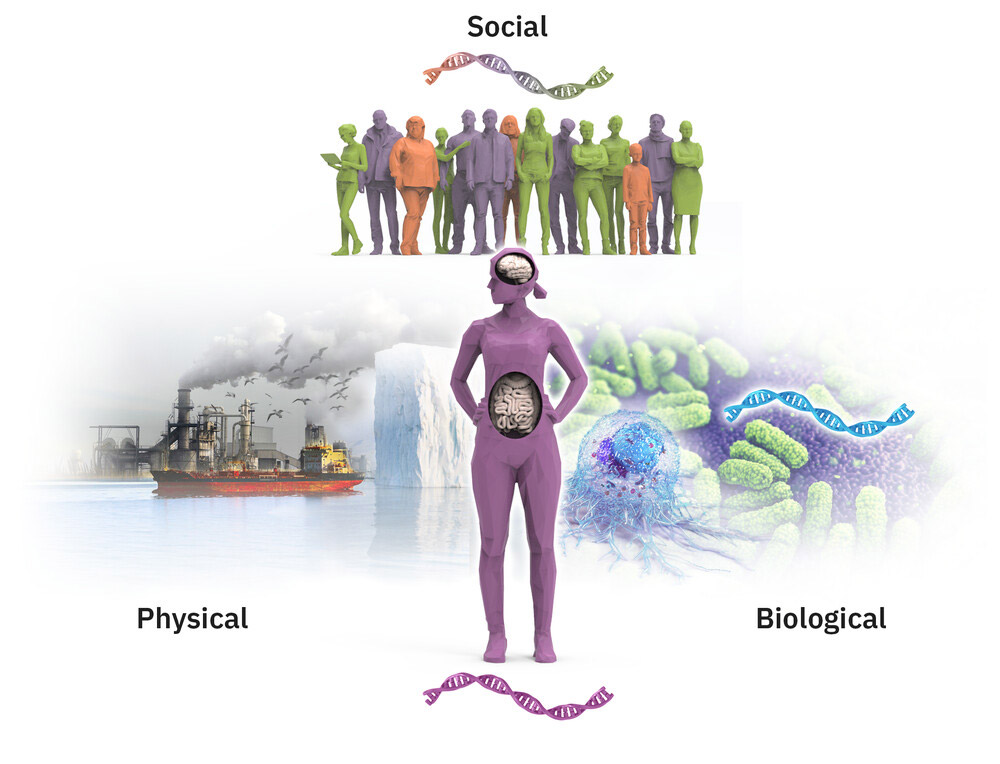
Helen Parkinson
Team Leader and Senior Scientist
EditRecent technological advances, both experimental and computational, make it possible to address key questions that will bring a quantitative, mechanistic, and molecular understanding of environmental effects on human biology. Human Ecosystems research and services at EMBL aim to arrive at a molecular understanding of how we interact with our physical, biological, and social environments to identify avenues for the mitigation and treatment of disease.
The Human Ecosystems research theme will take advantage of rapidly expanding human datasets to explore the gene–environment interplay and its effects on human phenotypes. We will bring these insights to the laboratory to be experimentally tested using state-of-the-art molecular genetic techniques in cells, organoids, organs-on-a-chip, and animal models. Research in this theme will leverage the unprecedented depth and breadth of emerging human cohort data and develop novel computational and statistical methods to mechanistically integrate environmental, molecular, and genomic data to dissect the molecular mechanisms of environmental risk factors.
A central question in Human Ecosystems research is how environmental factors mediate phenotypes and, more generally, how genotype and environment interact and influence molecular, cellular, or organism phenotypes in areas such as health, disease, development, and ageing. With close collaboration of scientists from a range of disciplines both within and outside EMBL – including epidemiologists, psychologists, statisticians, molecular biologists, cell biologists, physiologists, and theoreticians – this research theme will study the environment through various lenses from the cellular and tissue level to the organismal and population levels.
At the human data level, Human Ecosystems research will involve the exploration of large scale human exposome, phenotype, and genotype data (e.g. UK Biobank, Danish Health Data) to extract novel associations that link environmental exposure to human traits and disease risk. Where available, human genetic, chemical exposure, and pharmacological data will then be leveraged to identify molecular mediators or modifiers of these environmental risk factors. The EMBL data services will aim to develop open data capabilities and tools to facilitate the responsible and ethical sharing and distributed analysis of human data resources and the development of statistical tools for the integration of these data with existing molecular datasets. Researchers at EMBL will work in close synergy with service staff to link human datasets and extract hypotheses about the molecular mechanism of environmental risk factors that can be experimentally tested in the laboratory under controlled conditions.
At the organismal level, Human Ecosystems research will aim to identify the physiological and molecular mechanisms by which chemical pollutants, nutrients, infectious agents, microbial commensals, sensory stimuli, social stressors, and other environmental factors impact the organism and precipitate disease. Leading-edge techniques and model systems can be applied to address causally how environmental factors may affect molecular phenotypes in normal tissues or disease states.
Current frontiers at the molecular and intercellular level include the development of experimental techniques for coupled single-cell, spatial, multi-omic, and cellular imaging with a major emphasis on emerging imaging and structural biology techniques, which make it possible to uncover microenvironmental effects mediated by human cells or commensals on cellular interactions. The Human Ecosystems theme will also leverage technology developments by EMBL Services and Core Facilities to allow for an understanding of environmental effects on human cells at the most fundamental molecular level.
“The physical, biological and social environment deeply impacts humans in complex and often interconnected ways. Now more than ever, it is important to understand how our health depends on our environment. The Human Ecosystems Research Theme is about dissecting the molecular basis for these interactions, merging approaches from both experimental and the data science perspectives.”

Team Leader and Senior Scientist
Edit
Algorithm identifies gene–environment relationships
Understanding brain tumors in children
EMBL co-develops new method that could facilitate cancer diagnosis
Genetic makeup of ‘room-mate’ influences health
Cornelius Gross
Group Leader, Head of EMBL Rome, Co-Chair of Human Ecosystems
Helen Parkinson
Team Leader, EMBL-EBI, Co-Chair of Human Ecosystems
Oliver Stegle
Group Leader, EMBL Heidelberg, Co-chair Human Ecosystems
Amy Foreman
Human Ecosystems Scientific Programme Manager, EMBL-EBI
From exploring the molecular components inside a cell to studying whole populations and ecosystems, EMBL scientists will explore these different scales through eight research themes that foster collaborative, multidisciplinary research.
Learn more about the technologies referred to in the EMBL Programme (pdf)